History
There have been several stages to Keystone’s development. From 2001-2003, David Bonbright initiated discussions on establishing new measuring and reporting practices for social change. This led to a steering committee being formed and culminated in an inception report published in October 2003. More information about our early sponsors and the inception report are available from our website.
The following year the Aga Khan Foundation seconded David to the initiative. Initial seed capital from the Omidyar Network and Hewlett Foundation allowed Keystone (then known as ACCESS) to come into existence. AccountAbility hosted Keystone and operations began in September 2004. Senior staff quickly came on board including Andre Proctor, based in South Africa. The board of trustees was assembled.
Subsequently, Keystone engaged in a range of piloting, learning and development activities, including with the Philippine Council of NGOs and the Nelson Mandela Foundation. We developed initial tools and models, deepened our knowledge of the field, and built a strong network of accountability innovators. In parallel with this methodology development work, we delivered a variety of evaluation-related services to clients. By 2007 our experience and learning had crystallized around the concept of constituency voice.
Without steady support from Hewlett Foundation amounting to $1.7 million over four years, Keystone could never have fledged the nest. Similarly, core support currently provided by the Metanoia Fund, has made growth possible.
In addition to our fiduciary trustees, Keystone has benefitted from a group of advisors that we call our Method Trustees. They include Srilatha Batliwala, Dr. Anabel Cruz, Jacinto C. Gavino, Dr. Catherine A. Odora-Hoppers, Dr. Mark Orkin and Jamey Power.
Many wonderful citizen sector leaders have provided steady encouragement and wise counsel since our first steering committee members. In particular, we would like to acknowledge the contributions of Tade Aina, Alesha Black, Gale Berkowitz, Lucy Bernholz, Evan Bloom, Kevin Bolduc, Paul Brest, Alice Brown, Phil Buchanan, David Campbell, Fred Carden, Carolyn Carr, Helene Clark, Jack De Gioia, David Devlin-Foltz, Don Doering, Bill Drayton, Sarah Earl, Alnoor Ebrahim, Jed Emerson, Katherine Fulton, Tom Garwin, John Gerhart, Kent Glenzer, Peter Goldberg, John Goldstein, Lawrence Haddad, Jacob Harold, Brent Harris, Pamela Hartigan, Caroline Hartnell, Stephen Heintz, Burr Heneman, Jan Jaffe, Tom Kessinger, Sanjeev Khagram, Barbara Kibbe, Maritta R von Bieberstein Koch-Weser, Venkat Krishnan, Ann Kubisch, Mari Kuraishi, Michael Lerner, Antonella Mancini, Moeletsi Mbeki, William Meehan, Malusi Mpumlwana, Nancy MacPherson, Kumi Naidoo, Randy Newcomb, Linda Nguyen, Perla Ni, Iqbal Paroo, Zenda Ofir, Jamie Radner, Tom Rautenberg, Peter Raynard, Patricia Rogers, Harold Rosen, Lester Salamon, John Samuel, Buzz Schmidt, Jason Scott, Henrik Skovby, Raj Shah, Paul Shoemaker, Pushpa Singh, Ingrid Srinath, Sean Stannard-Stockton, Fay Twersky, Diana Wells, Steve Waddell, Dennis Whittle, Richard Woo, Janet Visick, Simon Zadek.
Former staff enriched us in both their work and their humanity: Gavin Andersson, Alejandro Litovsky, Siobhan MacCarthy, Cassie Boyd, Françoise d’Estais.
Theory of Change and Strategy
Keystone’s theory of change posits that social purpose organizations will achieve more if they systematically build effective learning relationships with other constituents of the change processes in which they engage.
Based on our theory of change and our experience, we have developed a two-prong strategy:
- Carry out selective demonstrations, through which we seek to help organizations develop their own theories of change and improve relationships with constituents. This includes: running pilots with funders and implementers, developing practical tools for their use, contributing to related initiatives, creating a global comparative feedback data platform, and modeling our approaches in our own work.
- Influence key decision-makers and practitioners by: (a) engaging them in relevant debates, (b) building a movement of people and organizations committed to promoting constituency voice, and (c) giving away our analysis, tools, feedback data, reports and case studies.
For a more detailed record of our theory of change, analysis, strategy, services, and resources, please see our website.
Structure and Staff
Keystone Accountability is an international agency that is incorporated as three separate, self-governing tax exempt, not-for-profit entities in the USA, UK and South Africa. The three fiduciary boards approve policy and strategy. There is a unified management structure overseen by David Bonbright. The UK and US boards were created with a degree of overlap, appropriate for the initial stage of our growth. We are now working on increasing the separateness and diversity of the different boards.
Keystone Method Trustees
- Srilatha Batliwala
- Dr. Anabel Cruz
- Jacinto C. Gavino
- Dr. Catherine A. Odora-Hoppers
- Dr. Mark Orkin
- Jamey Power
Our staff members are recognized development professionals and are often invited to speak at international conferences and other events.
Keystone Staff
- David Bonbright, Chief Executive
- Andre Proctor, Director, Programme Services
- Kai Hopkins, Operations and Finance Manager
Keystone’s Fiduciary Boards
- USA: David Bonbright, Peter Hero, Eric Kolodner, John E. Lange
- UK: Peter Hero, Eric Kolodner, John E. Lange
- South Africa: Nomvula Dlamini, Francis Wilson, André Proctor, David Bonbright
Keystone’s Contributions
Since 2004, we have identified several areas where we believe we have made a contribution, and others where we need to do more. We stated these in our constituent survey; the responses largely confirmed our expectations. We were pleased and surprised by the high response rates of the survey. We note, with a determination to improve, that 78 per cent of the people who gave a rating said they are comfortable with recommending Keystone to others.
|
THE KEYSTONE RESULTS LEDGER Since the creation of Keystone in 2004 we have been keeping a record of evidence of the results that we can see from our work in our day-to-day activities. We use the Results Ledger as part of our internal impact planning, |
Services
We offer high quality monitoring and evaluation services to NGOs and donors. We have worked with a variety of organizations around the world, including those working at community, national and international levels. Our involvement with them has provided us with learning opportunities as well. We are now better equipped to tailor our tools and services to local contexts and according to particular organizations’ needs.
Our two major service offerings are: M&E system design and feedback surveys.
We use our ‘Impact Planning, Assessment and Learning’ (IPAL) method to design M&E systems. It provides a coherent framework to meet the evaluation needs of all actors and foster constituency voice. We work with clients to implement these services in ways that are adapted to their specific circumstances. See the boxes for more detail about IPAL and feedback.
We also work with civil society organizations by facilitating communities of practice and running workshops and seminars.
During our early exploratory phase, feedback from our clients and partners has been continuous, intense but unsystematic. As we move into a phase of service delivery, we are putting a formal system of client and partner satisfaction surveys in place.
The examples below illustrate the range of recent and current work:
Grantee feedback surveys
Working with two different groups of African grantmakers, we have implemented anonymous surveys to their grantees. The surveys provide a mechanism for grantees to say what they really think about how the grantmakers work that generates comparative data. This is important as individual grantmakers can see how they rate against other grantmakers, clearly identifying areas of better and worse practice.
|
FEEDBACK SURVEYS Keystone helps develop and conducts anonymous surveys that capture the perceptions of an organization’s work by its constituents, tailored to their individual context and requirements. This generates learning opportunities and ultimately helps to improve an organization’s performance and impact. From our experience in promoting feedback systems in the last 2 years, we found that many agencies see the potential and are ready to embrace feedback and cultivate constituency voice. With feedback comes ethical responsibility. In order to respect this, we have developed a guidance framework, available here. Try the power of feedback for free using our simple on-line Feedback App. It only takes a minute to set up, and provides a simple way for your constituents to tell you what they think |
IPAL (M&E) system design
We are working with a major international health advocacy campaign, to design an impact planning, assessment and learning system to track the results of their work. The system will include intermediary indicators, like measures of their influence with key policy makers and advocacy targets. We have worked with many other organisations in this way, from community organisations to national and international grant makers.
|
IMPACT PLANNING, ASSESSMENT AND LEARNING SYSTEMS Our method for developing M&E systems is called Impact Planning, Assessment and Learning (IPAL). There are five steps in setting up an IPAL system:
All of these elements are carefully designed to include the voices of all relevant constituents at every stage. We particularly emphasise listening to primary constituents. The theory of change locates a project within a wider system of change, by identifying all the factors and actors that influence the social changes being considered. Our approach calls for thinking outside a single organization to all those who have to do what to achieve and sustain those changes. Dialogue is nurtured and continued through the steps. For instance, even the monitoring process can be used to build better relationships. The final step, deliberation, feeds back into a review of the theory of change and strategies, and the next cycle of planning, assessment and learning for improved relationships and increased impact. |
Technical assistance
Working with one of the largest private funders in the world, we are collaborating in a project to provide rapid response advice on their grantees’ monitoring and evaluation systems. This has included reviewing plans and working with grantees to strengthen their approaches, including enhancing constituency voice.
“Keystone’s impact planning, assessment and learning methodology has really changed our strategic thinking and our approach to our work in a tremendous way. The Fund is experiencing a dramatic shift in its vision of success as a dynamic system and now better appreciates the key actors who are central to our organizational success.” Moipone Buda-Ramatlo, Nelson Mandela Children’s Fund, South Africa
Feedback system design
We are setting up a pilot with a large international coffee project to help them monitor the strength of farmer groups they are working with. This aims to provide actionable management data on the governance and effectiveness of groups, from the point of view of farmers themselves. The data will be disaggregated between women and men. To take another example, we are working with nine international networks to get comparative feedback from their members and other key constituents. Individual reports will be prepared for each network, with the aim of increasing understanding of relationships within networks and identifying areas for learning and improvement.
Guides and tools
Keystone has developed a range of guides and tools to help organizations strengthen constituency voice. They are freely available and can be downloaded from our website. They are the product of our evolving experiences and expertise and we have tried to make them as adaptable as possible, so they can be used for a variety of contexts and purposes. They include:
- Impact planning, assessment and learning (IPAL) – Overview and implementation guide
- Developing a theory of change guide
- Interactive theory of change building template
- Learning with constituents guide
- Ethical framework for feedback activities
- Constituency voice assessment framework
– A survey respondent
In our survey, we asked our constituents to rate their usefulness and the results were encouraging. An overwhelming percentage of respondents stated that they were not familiar with our tools and guides (73 percent).
From those respondents who were familiar with the tools, as can be seen from the graph below, 63.3 percent gave them a high or very high rating. If one looks only at responses of those with a significant degree of familiarity with Keystone, the approval ratings go over 83 percent.
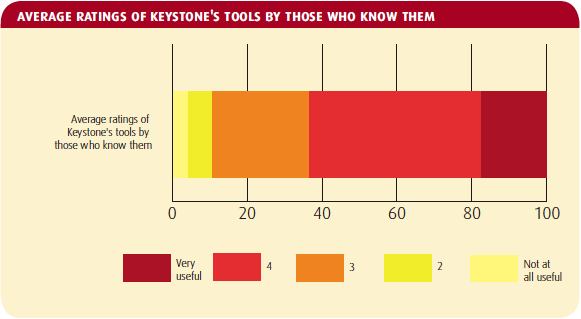
Research and Analysis
In addition to our tools, we also regularly publish articles and research papers in relevant sector-wide media. Some of our publications, like the BOND Approach to Quality Standards in NGOs and The 21st Century Potential of Constituency Voice, have gained popularity and have been judged as useful and thought provoking by various actors.
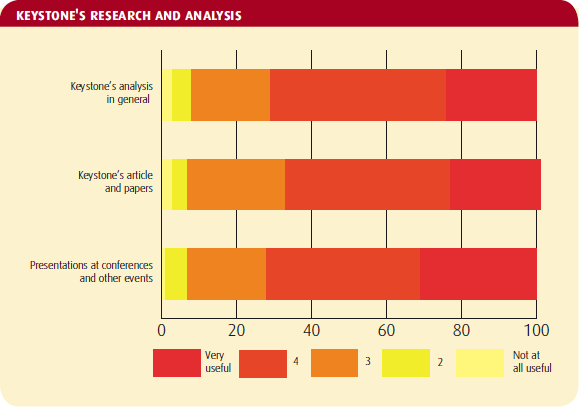
– A survey respondent
As with our tools, the longer people know Keystone, the more likely they are to value our analysis and research and assert its relevance to the development sector. We also asked respondents to evaluate those elements in our work that they are familiar with. More than two thirds of the respondents who gave ratings assessed our general analysis and our research articles and papers as useful or very useful.
However, again, the majority of respondents stated that they are not familiar with our research and publications (64 percent). The graph above shows the responses of the 46 percent of respondents who were familiar with our work. It shows that about 70 percent give us high marks. If we select those who know us well, the scores go up to 90 percent. But for us the 30 percent who are not impressed is a more significant result. We can and will do better!
Click here for a list of resources, including Keystone’s guides, reports, articles and presentations.
Influence and Advocacy
– A survey respondent
We aim to position Keystone as a respected source of comment and innovation in the fields of monitoring and evaluation, feedback systems and constituency voice.
Our survey results suggest that we have been able to influence the opinions of people working in the development sector around the world, especially in the field of nonprofit consulting.
People who know Keystone are much more likely to believe that there is a link between constituency voice and improved performance of organizations working in the development sector around the world – 78 percent see the link, compared with 62 percent of those who do not know Keystone.
Use of our website
There have been 103,065 visits to www.keystoneaccountability.org from 1st June 2007 to 30th September 2009. The average number of visits per month was 2,300 in 2007, 4,220 in 2008 and 4,019 in 2009.
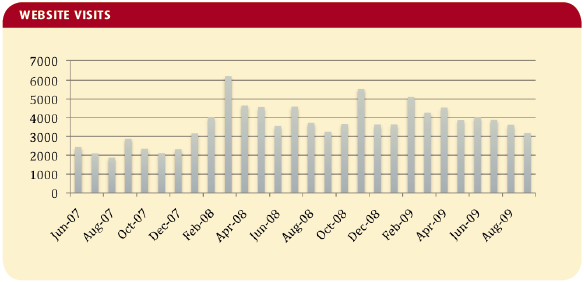
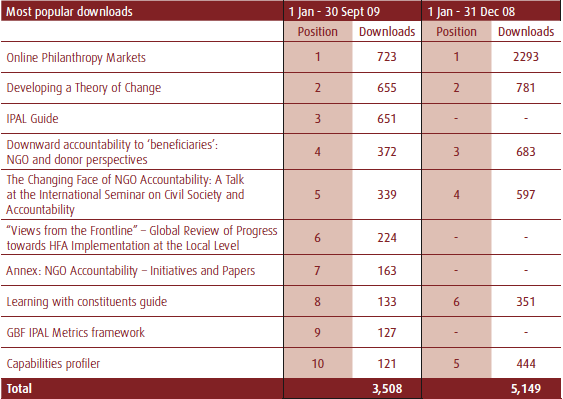
This table shows a baseline for use of the terms “constituency voice” and “impact planning, assessment and learning”. At the moment, three major internet search engines show that the vast majority of online references to these terms are generated directly by Keystone. We hope to see this change in the future, if and when as more organisations start to use these terms.
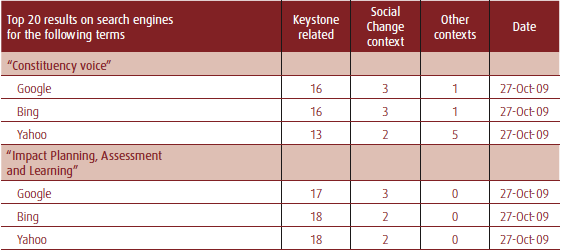
Section 5/7 BACK NEXT
Back to Table of Contents
